In the Marxian Workshops
New Politics of Autonomy
Series Editors: Saul Newman and Martina Tazzioli
In recent years, we have witnessed an unprecedented emergence of new forms of radical politics from Tahrir Square, Gezi Park and the global Occupy movement, to Wikileaks and hacktivism. What is striking about such movements is their rejection of leadership structures and the absence of political demands and agendas. Instead, their originality lies in the autonomous forms of political life they engender.
The New Politics of Autonomy book series is an attempt to make sense of this new terrain of anti-political politics, and to develop an alternative conceptual and theoretical arsenal for thinking the politics of autonomy. The series investigates political, economic and ethical questions raised by this new paradigm of autonomy. It brings together authors and researchers who are engaged, in various ways, with understanding contemporary radical political movements and who approach the theme of autonomy from different perspectives: political theory, philosophy, ethics, literature and art, psychoanalytic theory, political economy, and political history.
Series Titles
Spaces of Governmentality , by Martina Tazzioli
The Composition of Movements to Come , by Stevphen Shukaitis
Foucault and the Making of Subjects , edited by Laura Cremonesi, Orazio Irrera, Daniele Lorenzini and Martina Tazzioli
Italian Critical Thought: Genealogies and Categories , edited by Dario Gentili, Elettra Stimilli and Glenda Garelli
In the Marxian Workshops: Producing Subjects , by Sandro Mezzadra
Anarchisms, Postanarchisms and Ethics , by Benjamin Franks
In the Marxian Workshops
Producing Subjects
Sandro Mezzadra
Translated by
Yari Lanci

London New York
Published by Rowman & Littlefield International Ltd
Unit A, Whitacre Mews, 26-34 Stannary Street, London SE11 4AB
www.rowmaninternational.com
Rowman & Littlefield International Ltd. is an affiliate of Rowman & Littlefield
4501 Forbes Boulevard, Suite 200, Lanham, Maryland 20706, USA
With additional offices in Boulder, New York, Toronto (Canada), and Plymouth (UK)
www.rowman.com
Copyright 2018, Sandro Mezzadra
Mezzadra, S. (2014) Nei cantieri marxiani: il soggetto e la sua produzione .
Roma: manifestolibri.
All rights reserved . No part of this book may be reproduced in any form or by any electronic or mechanical means, including information storage and retrieval systems, without written permission from the publisher, except by a reviewer who may quote passages in a review.
British Library Cataloguing in Publication Data
A catalogue record for this book is available from the British Library
ISBN: HB 978-1-7866-0358-6
PB 978-1-7866-0359-3
Library of Congress Cataloging-in-Publication Data Available
ISBN: 978-1-78660-358-6 (cloth : alk. paper)
ISBN: 978-1-78660-359-3 (pbk. : alk. paper)
ISBN: 978-1-78660-360-9 (electronic)
 The paper used in this publication meets the minimum requirements of American National Standard for Information SciencesPermanence of Paper for Printed Library Materials, ANSI/NISO Z39.48-1992.
The paper used in this publication meets the minimum requirements of American National Standard for Information SciencesPermanence of Paper for Printed Library Materials, ANSI/NISO Z39.48-1992.
Printed in the United States of America
Contents
18B | The Eighteenth Brumaire , in Cowling, M. and Martin, J. (eds.). Marxs Eighteenth Brumaire. (Post)modern Interpretations . London: Pluto, 2002, pp. 19109. |
C , I | Capital: A Critique of Political Economy, vol. 1. Translated by B. Fowkes. London: Penguin Books, 1990. |
C, II | Capital: A Critique of Political Economy, vol. 2. Translated by D. Fernbach. London: Penguin Books, 1992. |
C , III | Capital: A Critique of Political Economy, vol. 3. Translated by D. Fernbach. London: Penguin Books, 1991. |
CCHPR | Introduction to the Contribution to the Critique of Hegels Philosophy of Right , in Early Writings . Harmondsworth: Penguin Books, 1992, pp. 24357. |
CCPE | A Contribution to the Critique of Political Economy , in MECW , 29, pp. 257420. |
CF | Concerning Feuerbach, in Early Writings . Harmondsworth: Penguin Books, 1992, pp. 42123. |
CGP | Critique of the Gotha Programme, in The First International and After. Political Writings, vol. 3. Edited by D. Fernbach. London; New York: Verso, 2010, pp. 33959. |
CHDS | Critique of Hegels Doctrine of the State , in Early Writings . Harmondsworth: Penguin Books, 1992, pp. 57198. |
CSF | The Class Struggles in France: 1848 to 1850, in Surveys from Exile. Political Writings, vol. 2. Edited by D. Fernbach. London; New York: Verso, 2010, pp. 35142. |
CWF | Civil War in France, in The First International and After. Political Writings, vol. 3. Edited by D. Fernbach. London; New York: Verso, 2010, pp. 187236. |
EPM | Economic and Philosophical Manuscripts of 1844 , in Early Writings . Harmondsworth: Penguin Books, 1992, pp. 279400. |
G | Grundrisse: Foundations of the Critique of Political Economy . Translated by M. Nicolaus. London: Penguin Books, 1993. |
GI | The German Ideology , in MECW , 5, pp. 19539. |
HF | The Holy Family , in MECW , 4, pp. 5211. |
JQ | On the Jewish Question, in Early Writings . Harmondsworth: Penguin Books, 1992, pp. 21141. |
MCP | Marx, K. and Engels, F. The Communist Manifesto . Translated by Samuel Moore. London: Penguin Books, 2002. |
MECW, 150: | Marx, K. and Engels, F. Collected Works . London: Lawrence & Wishart, 19752005. |
PP | The Poverty of Philosophy. Answer to the Philosophy of Poverty by M. Proudhon , in MECW , 6, pp. 105212. |
RIPP | Results of the Immediate Process of Production (Unpublished Chapter VI), in Capital: A Critique of Political Economy, vol. 1. Translated by B. Fowkes. London: Penguin Books, 1990, pp. 9481065. |
VPP | Value, Price, and Profit, in MECW , 20, pp. 10149. |
I am particularly happy to write this introduction to the English edition of my book on Marx, which came out in Italian in 2014. It is a short book, which weaves a pretty dense conceptual fabric interlacing a close reading of Marxs texts and the contemporary debates surrounding the question of the production of subjectivity. I am grateful to Yari Lanci for the passion and commitment he devoted to the translation of the book. New questions and problems have arisen in discussion with him over the last months, demonstrating that translating a text can be something different and more challenging than simply transposing words and sentences from one language into another. I have to thank Yari for reminding me in a very concrete and effective way of that point, which is often made in studies on the politics of translation, simply through the way in which he performed the task of the translator.
Working on such diverse topics as migration, borders, postcolonial criticism, globalization, the extractive nature of contemporary capitalism, the transformations of labour as well as of such important political concepts as citizenship and sovereignty, I have entered multiple dialogues and collaborations in the last decade. I like sharing the practice of writing. I even appreciate both scholarly and politically the shadow of anonymity that hangs over cowritten texts. But the name of Marx, an accursed but still clandestine immigrant as he was all his life (Derrida 2006: 219), haunts any intellectual and political collaboration I am part of, any of the writings that matter (at least to me) in my attempt to make sense of this distracted world and to contribute to its radical transformation. Just to give a couple of examples: Brett Neilson and I could not have written Border as Method, or, the Multiplication of Labor without harking back to Marxs notions of labour power, abstract labour and world market. My work on extraction, again with Brett Neilson and Vernica Gago, would not have been possible without the new reading of Marxs analysis of the so-called primitive accumulation that I foreshadowed in an essay of 2007 (reprinted here as an appendix) and that we further developed in engaging discussions in India and Latin America. Again, we could not have been able to grasp the extractive nature of finance without picking up on some aspects of Marxs analysis of interest bearing capital in volume 3 of Capital , developed in front of a completely different financial world. And to close a list that could easily go on: my contribution to the collective, ongoing and transnational discussion on the autonomy of migration would be unconceivable without a critical reflection upon the question of the mobility of labour, and more generally upon the conditions of the encounter between labour power and capital in Marxs critique of political economy.

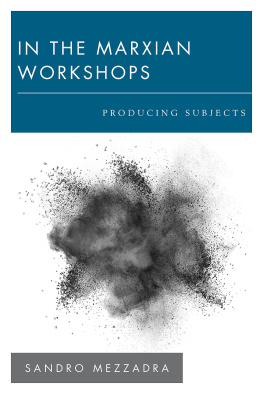
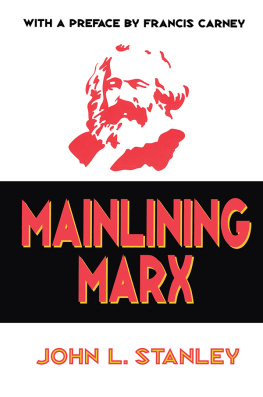
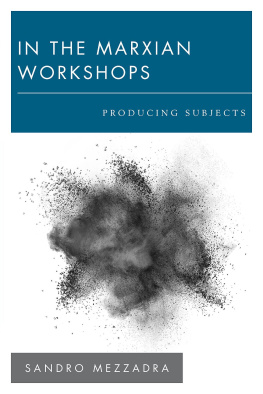


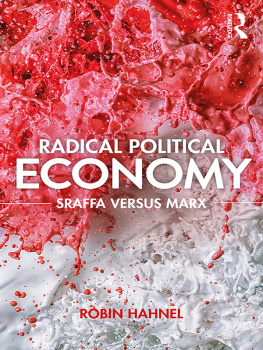
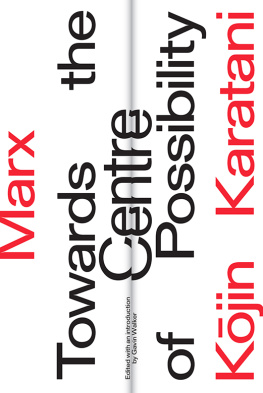
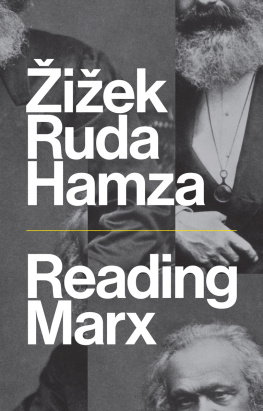
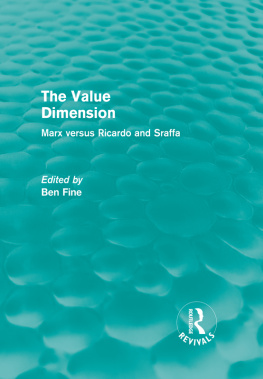


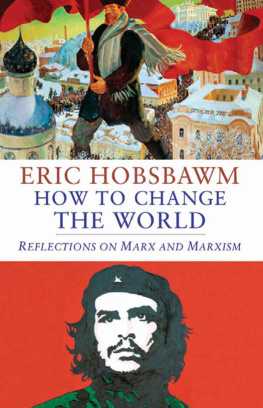


 The paper used in this publication meets the minimum requirements of American National Standard for Information SciencesPermanence of Paper for Printed Library Materials, ANSI/NISO Z39.48-1992.
The paper used in this publication meets the minimum requirements of American National Standard for Information SciencesPermanence of Paper for Printed Library Materials, ANSI/NISO Z39.48-1992.